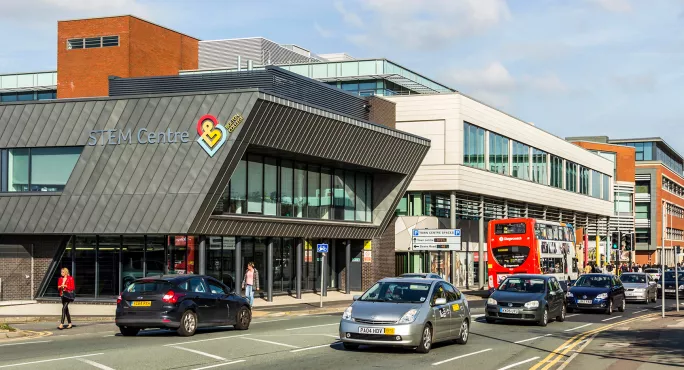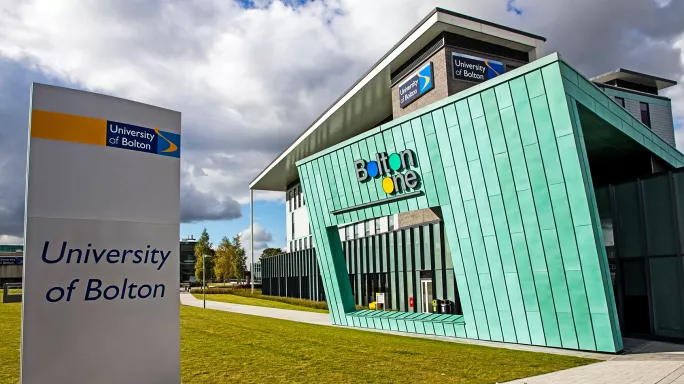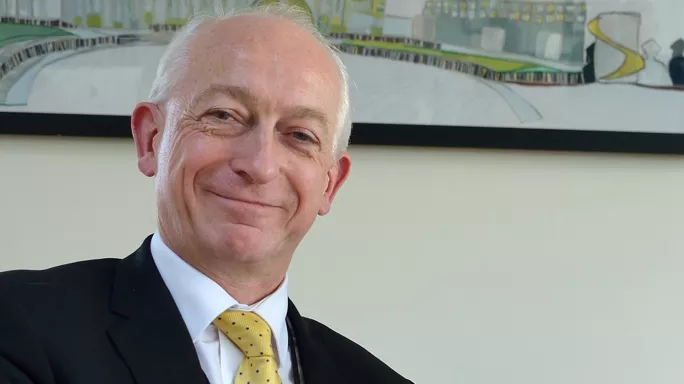- Home
- College-university mergers: ‘Why wouldn’t you?’
College-university mergers: ‘Why wouldn’t you?’

When further and higher education are discussed in the same conversation, talk lends itself to the competition between the two sectors, the lack of understanding they have of each other and the contrast between the neglected FE sector and the relatively lavish world of HE.
The situation in the northern town of Bolton, therefore, is a little unusual.
It’s hard to imagine any college and university being closer to each other, geographically speaking, than Bolton College and the University of Bolton. The two are directly across the road from each other, a mere stone’s throw apart. But a postcode isn’t the only thing the two institutions share.
Award-winning: Bolton College wins at AoC Beacon Awards
Area reviews: 15 reports and recommendations for colleges published
Opinion: Dear Ms Keegan, here’s what you need to tackle first
Bolton College and the University of Bolton belong to the same university group - a legal structure between FE and HE that exists in two places in England: Bolton and London, where Lambeth College joined with London South Bank University.
Both mergers were the result of the area reviews into post-16 education that aimed to ensure that institutions were “financially viable, sustainable, resilient and efficient, and delivered maximum value for public investment” and had “an offer that meets each area’s educational and economic needs”.
Three years since the merger in Bolton was mooted, the town’s college principal, Bill Webster, is confident that the move has achieved both of these aims, with both the college and the university benefiting from the merger in more ways than one.
The college and university merger
Bolton College’s FE corporation was formally dissolved on 1 August 2018 and all of its property, rights and liabilities were transferred to a “designated institution” under the company name of Bolton College. Bolton College then became a wholly-owned subsidiary of the University of Bolton and is now part of the university group. Both institutions have their own governing boards.
The unusual move didn’t happen overnight, says Webster. Like many colleges and universities in the same town or city, historically there hadn’t been much communication between the two organisations - a little about student progression, he says, but nothing formal.
“Today, size and scale matter in a way they didn’t before. The chair of our college board has always been very, very entrepreneurial and could see the potential in being part of something bigger,” Webster says.
Discussions began to take place between the two boards to see if the recommendation to merge could become a reality. At the time, Webster was working at the university as assistant vice-chancellor, and when Bolton College’s principal left for a different role, Webster moved over to be interim principal at the college, before going on to secure the role permanently.
The mutual understanding and respect between the two organisations comes from the very top. George Holmes, the current vice-chancellor of the university, started his career as an FE lecturer and went on to become principal of Doncaster College.

“I’ve spent half my career in FE and half in FE - and so has George,” says Webster. “One of the problems you’ve got with FE and HE is that there are many in the sector, particularly the HE side, who have maybe a misunderstanding of what FE is about, and a particular view where FE sits in sort of a hierarchical setting. That’s not the case here.”
The expertise in both sectors is also shared at board level: the college picked three members of its staff to sit on the university board and vice versa.
“We’ve both got people who see both sides of the equation. If you talk to the independent members of our board here, who are FE through and through, pre-merger one or two of them would say they had concerns. And now, they are probably the strongest advocates for it,” Webster says.
Curriculum collaboration
The close proximity of the two campuses made it very easy to broker the partnership, he adds. All of the college heads of departments could walk 10 yards to meet up with their counterparts in the university to map the two curricula to ensure one led seamlessly into the other.
The merger hasn’t been completely issue-free, however. Problems did arise when the regulations of the Education and Skills Funding Agency and Office for Students didn’t match up. But overall, Webster says, it’s been a positive experience for both institutions.
Webster is clear that the main driver behind the merger was the opportunities it would give the students. But the financial benefit for the college isn’t something to be ignored. The college took out a loan, unwritten by the university, providing it with a financial stability that many others simply don’t have.
“It was one of the very early days discussions. The university was in a very strong financial position and the college was in an OK financial position, as much as anyone is in FE,” Webster says.
“There’s a chill wind out there in the FE sector. Obviously, with the college insolvency regime coming in... we’ve seen what can happen to colleges that are not in a good place. The loan that sits within the college has got support, if needs be, from the university. We’ve got some financial strengths in there, which is good for us, and the group as a whole becomes a lot more robust.”
And that financial stability ensures that the college can continue to cater for the thousands of students that come through its doors. Webster says that, thanks to the merger, these students now have a clear line of sight to higher education.
College students aiming for university
“We always look for the best outcomes for our students, whether that be HE, any other qualification or the workplace. Our advice is always about what’s best for them but increasingly, they’re coming in knowing that there’s a through route into the university.
“It’s about raising that aspiration. University staff come across to deliver masterclasses at college. The students use the university facilities and have experiences over there that widen their horizons.”

Webster talks about five women who came to Bolton College to do some community learning. They had no qualifications and some couldn’t speak English. They’re currently on level 3 health courses, having completed their levels 1 and 2. All five have got places on the nursing course at the university.
He also highlights the Bolton College of Medical Sciences, which is due to open next year. It’s a £30 million-pound development in partnership with the NHS and the Bolton university council, and will train millions of health professionals in much-needed jobs. It’s a project neither institution would have been able to run by themselves: both the college and the university got separate pots of funding for it - and it’s a project that will benefit Bolton for years to come.
College staff, too, have made the most of the merger. Twenty-eight of them are currently studying master’s degrees at the university and two are on doctoral programmes. University staff have, in turn, accessed the range of vocational courses the college offers, with many completing accounting or administration courses.
“We’re not only getting staff having opportunity to develop their understanding and knowledge, particularly around the education pedagogy, but also that gets fed back into what we’re doing here,” Webster says.
‘The logic is inescapable’
So is a merger something that Webster would recommend that other colleges and universities consider? He says he has had up to 10 college principals contact him over the past three weeks to gain an insight into how the merger works.
“The logic is inescapable. Frankly, I mean, why wouldn’t you do it? In the right circumstances, it can be really, really powerful,” he says.
However, he doesn’t downplay how crucial the geographical element is - and how key it’s been to this merger’s success.
“I wouldn’t say it would be impossible to do it remotely. But I can see the significant advantages of having a proximity around what you’re doing. I don’t think it would have worked as well if we had been 10 miles away,” Webster says.
Above all else, the culture and attitude must be there, he says. If the vice-chancellor, principal and chairs of boards aren’t driving the change, it won’t work.
“If you have a university that fully understands and recognises and values what FE does, you are in with a fighting chance. But it’s both ways, you know. If you weren’t careful there could be a risk of, let’s be frank, snobbishness cropping in or, you know, a different set of values, crashing into each other,” Webster says.
“So in our case, we’ve got a very new university with very grounded staff who are keen to work for the best endeavours of their student body. They are very open-access - and so are we. We were talking the same language, and we both delivered different things.”

Webster brings our conversation back to the “chill wind” that he says is engulfing the sector: “We’re reaching the point where being on your own isn’t that sustainable. Grouping together, it doesn’t necessarily have to be quite our structure, but having close collaboration in sectors is the only way to go.”
Emma Hardy, Labour’s shadow FE and HE minister, says that she agrees that the FE and HE sectors need to work together better, and that Bolton’s case is really interesting.
“There are difficulties but collaboration should be encouraged wherever possible,” she says. “We have to find a way for FE and HE to work together and stop competing with each other. While the push for level 4 and 5 qualifications is great and well-needed, it already seems to be gearing up the competition. Is that going to be offered by universities or is that going to be offered by colleges?”
She suggests that regional devolution could be key. “If you can devolve the funding and give mayors oversight of the whole thing, you can get the powers down to look at this and say, ‘Which is the best institution to offer this particular course?’ and take a more objective view of it rather than institutions competing over everything.”
Webster agrees and says that when colleges are located side by side, there is naturally a competitive edge and constant fight over which students go where. To overcome this, systemic change is needed, he says.
“That’s not going to go away, but we have to get past that and look at the bigger picture for the sake of the students, staff and colleges.”
Keep reading for just £1 per month
You've reached your limit of free articles this month. Subscribe for £1 per month for three months and get:
- Unlimited access to all Tes magazine content
- Exclusive subscriber-only stories
- Award-winning email newsletters



